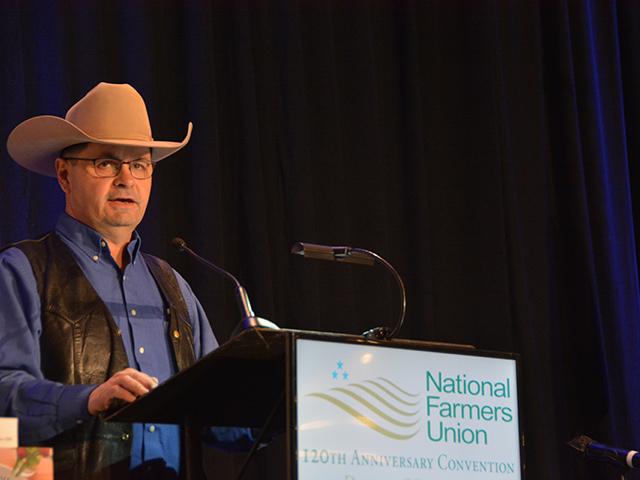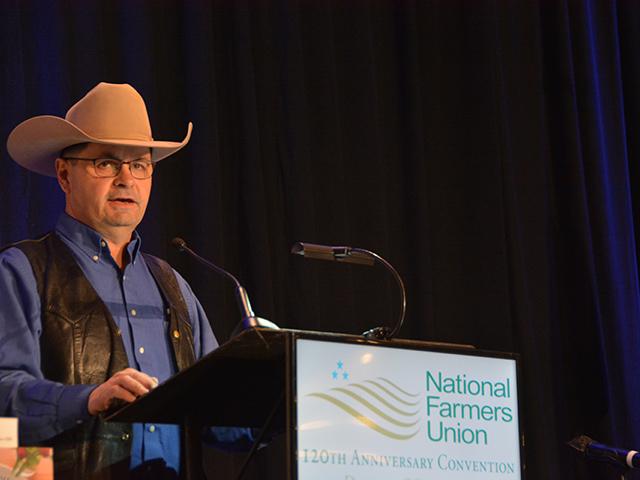Ag Policy Blog
FSA Administrator: Most FSA Offices Open for Farmer Appointments
DENVER (DTN) -- Farm Service Agency Administrator Zach Ducheneaux praised FSA employees for their work during the pandemic and acknowledged there are growing calls from farm groups to reopen all FSA offices back to full capacity.
Ducheneaux addressed an array of topics Monday during a speech to members of the National Farmers Union in Denver and an interview with DTN on farm programs and office staffing.
FSA STAFF AND OFFICES
"During a global pandemic, there were producers that needed them, and they did their job," Ducheneaux said. "They might not have been in the office, which has been a bone of contention with some organizations, but they got the job done probably to as much as 160% of normal."
In addition to the standard programs such as ARC and PLC, the Conservation Reserve Program (CRP), the dairy programs and loan programs, FSA staff found themselves providing an array of disaster aid programs such as multiple variations of the Coronavirus Food Assistance Program (CFAP) to deal with the economic realities producers were facing.
"It's been a year now that I've been here and it's been the fastest year of my life," Ducheneaux said. "But it's also been one of the most enjoyable because I get to come to events like this and see what it's all about."
After talking to NFU members, Ducheneaux was asked why it is taking so long for the Biden administration to get FSA directors and other state leaders in place. As of Monday, USDA has appointed 34 state FSA directors. Ducheneaux responded, "The quality of the folks that we're picking is indicative of the time that's been taken." He added, "Your point is well taken, we're doing everything we can to get that out the door, but it's absolutely not because it's not important to the administration."
Staffing at local offices continues to be a problem. Ducheneaux said Agriculture Secretary Tom Vilsack raises that issue with lawmakers on Capitol Hill. Ducheneaux said there "is an ongoing war of attrition to deploying federal resources in this country that the National Farmers Union and others have to stand up against." That's especially in counties with dwindling populations, he said.
Right now, an "overwhelming majority" of FSA offices are open at 75% capacity and taking appointments to have producers come in. During the throes of the COVID pandemic, FSA offices limited capacity to 25% of workers with no in-person visits. Ducheneaux said USDA has daily reports to update staffing and capacity levels at local offices.
"We all want full participation, full in-person attendance as much as anybody; but we've got to protect the safety of producers and the staff."
Reopening some offices has been more challenging because of continued high infection rates in those areas. "We continue to tie back to the science and vaccinations have been remarkably effective at controlling the spread and severity of COVID, and we want everybody to know that's our position. We still require masks in our offices as of now. We are waiting for guidance from the administration on when that posture will change; but that's all across the federal sector."
P[L1] D[0x0] M[300x250] OOP[F] ADUNIT[] T[]
USDA had tried to require FSA county committee members become vaccinated to remain as members. A lawsuit blocked USDA from enforcing that requirement and the injunction remains in effect.
"It's ironic. County committees oftentimes enforce our programs against their fellow producers for not following good scientific practices and vaccination of their livestock. If you've got a proven solution and you're not using it, you will be ineligible for programs. We try to highlight that and really bring it back to the scientific facts of the effectiveness of the vaccines preventing the spread and the severity of the disease."
Given that a certain group of producers wants the face-to-face contact with their FSA staff, Ducheneaux also suggested FSA should look at flexible schedules for their own staff to help with the producers who can't get into an FSA office until their daytime job ends. "What if we think about stretching that flexibility for staff and having flexible schedules where producers can come in after their five o'clock job?"
DISASTER AID
On disaster funding, Ducheneaux said the first phase of $10 billion in total funds for 2020-2021 disasters will roll out with the $750 million in disaster aid to livestock producers. FSA is looking at the Noninsured Crop Disaster Assistance Program (NAP) data to simply provide checks to producers in the coming weeks. "We've got the information so we're just going to try to send the payment out without having to go through an exhaustive application process. We're looking for similar avenues to do the same on the crop side."
Ducheneaux added there are new disasters. "When the WHIP-Plus program was authorized, we didn't know what a derecho was; so, we have got these things we have to deal with."
After passage of the disaster aid, Ducheneaux said FSA staff also had to have conversations with wine producers in California who have had two or three difficult years in a row because of fires. USDA had to understand the impact of problems such as grapes with "smoke taint and other aspects of production. So, we're trying to be inclusive and make sure that the program is reaching those as intended participants."
BOOSTING FARM INCOME
Noting the latest Economic Research Service study shows 11 cents of the food dollar goes to farmers, Ducheneaux said that's why commodity programs are so important. Farmers continue to get "less and less of that food dollar in their pockets." He added that 89% of farmers today get more than half of their income off-the-farm.
"If that was a choice, purely a choice, I would have no problem with that," he said. "But it's not a choice."
The Biden administration "is putting our money where our mouth is," referring to hundreds of billions of dollars already spent to address the "shackle space shortages that the big meat conglomerates will try to convince you are the problem." Ducheneaux challenged the messaging from large packers, saying if packers' profits were tied to output volume, they would be building more processing capacity. But the packing industry has been profitable in the past two years.
"They are able to hold us all captive and squeeze us in the middle and keep us from our consumers who would really like to know what our product is," Ducheneaux said.
DAIRY MARGIN COVERAGE
USDA last month extended sign up for the Dairy Margin Coverage program to March 25 because only about 48% of eligible dairy farmers had signed up for the program for 2022.
"Part of the issue is that dairy prices have rebounded and are good right now," Ducheneaux said. "And we just want to take an opportunity to remind producers that these things are volatile, prices fluctuate, and this is a very affordable protection that they can avail themselves of. So, we encourage all of our dairy producers to take a real hard look at that."
While the ARC/PLC sign up ends March 15, Ducheneaux said enrollment for those programs has been on target and he doesn't expect to see an extension there.
Ducheneaux noted when he began last year nearly all of his events were online, but he would give out his email so producers could reach him. "And I'm going to keep doing that as long as I get to do this job."
Ducheneaux's email is Zach.Ducheneaux@usda.gov
A video of Ducheneaux:
Chris Clayton can be reached at Chris.Clayton@dtn.com
Follow him on Twitter @ChrisClaytonDTN
(c) Copyright 2022 DTN, LLC. All rights reserved.






Comments
To comment, please Log In or Join our Community .